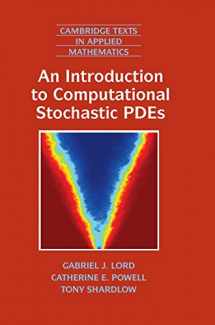
An Introduction to Computational Stochastic PDEs (Cambridge Texts in Applied Mathematics, Series Number 50)
ISBN-13:
9780521899901
ISBN-10:
0521899907
Edition:
1
Author:
Gabriel J. Lord, Catherine E. Powell, Tony Shardlow
Publication date:
2014
Publisher:
Cambridge University Press
Format:
Hardcover
516 pages
FREE US shipping
Book details
ISBN-13:
9780521899901
ISBN-10:
0521899907
Edition:
1
Author:
Gabriel J. Lord, Catherine E. Powell, Tony Shardlow
Publication date:
2014
Publisher:
Cambridge University Press
Format:
Hardcover
516 pages
Summary
An Introduction to Computational Stochastic PDEs (Cambridge Texts in Applied Mathematics, Series Number 50) (ISBN-13: 9780521899901 and ISBN-10: 0521899907), written by authors
Gabriel J. Lord, Catherine E. Powell, Tony Shardlow, was published by Cambridge University Press in 2014.
With an overall rating of 3.9 stars, it's a notable title among other
books. You can easily purchase or rent An Introduction to Computational Stochastic PDEs (Cambridge Texts in Applied Mathematics, Series Number 50) (Hardcover) from BooksRun,
along with many other new and used
books
and textbooks.
And, if you're looking to sell your copy, our current buyback offer is $2.77.
Description
This book gives a comprehensive introduction to numerical methods and analysis of stochastic processes, random fields and stochastic differential equations, and offers graduate students and researchers powerful tools for understanding uncertainty quantification for risk analysis. Coverage includes traditional stochastic ODEs with white noise forcing, strong and weak approximation, and the multi-level Monte Carlo method. Later chapters apply the theory of random fields to the numerical solution of elliptic PDEs with correlated random data, discuss the Monte Carlo method, and introduce stochastic Galerkin finite-element methods. Finally, stochastic parabolic PDEs are developed. Assuming little previous exposure to probability and statistics, theory is developed in tandem with state-of the art computational methods through worked examples, exercises, theorems and proofs. The set of MATLAB codes included (and downloadable) allows readers to perform computations themselves and solve the test problems discussed. Practical examples are drawn from finance, mathematical biology, neuroscience, fluid flow modeling and materials science.


We would LOVE it if you could help us and other readers by reviewing the book
Book review

Congratulations! We have received your book review.
{user}
{createdAt}
by {truncated_author}


